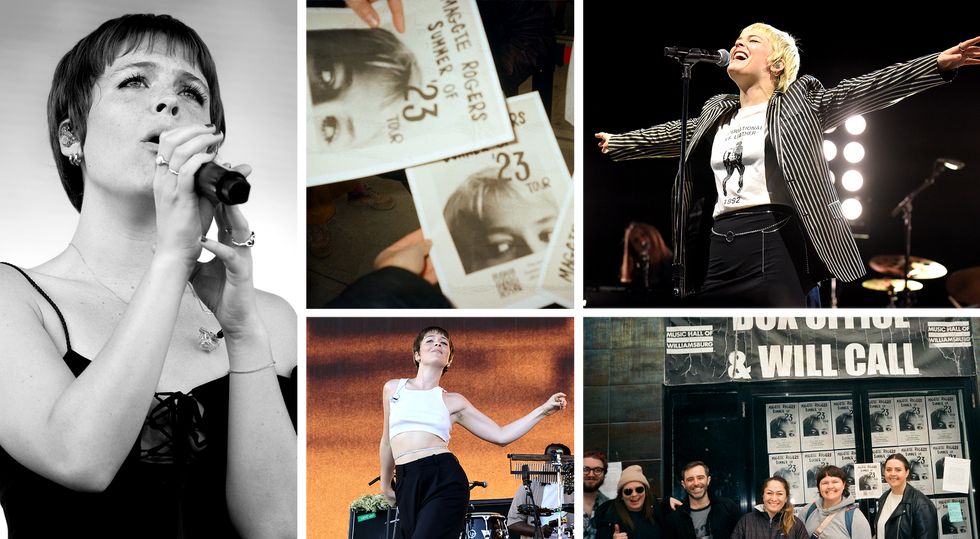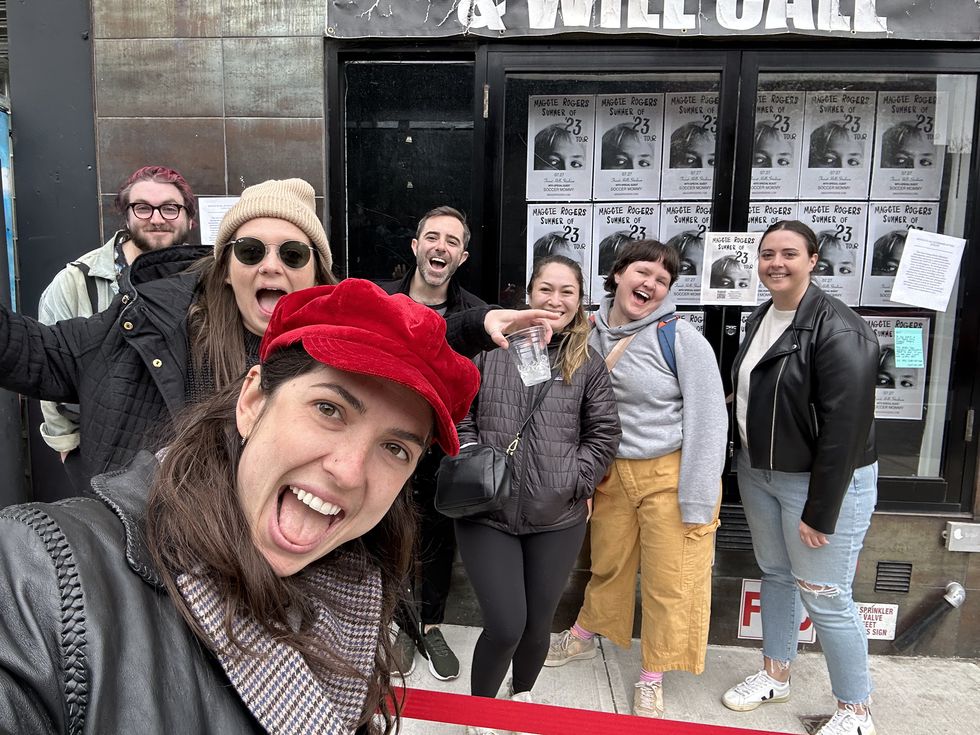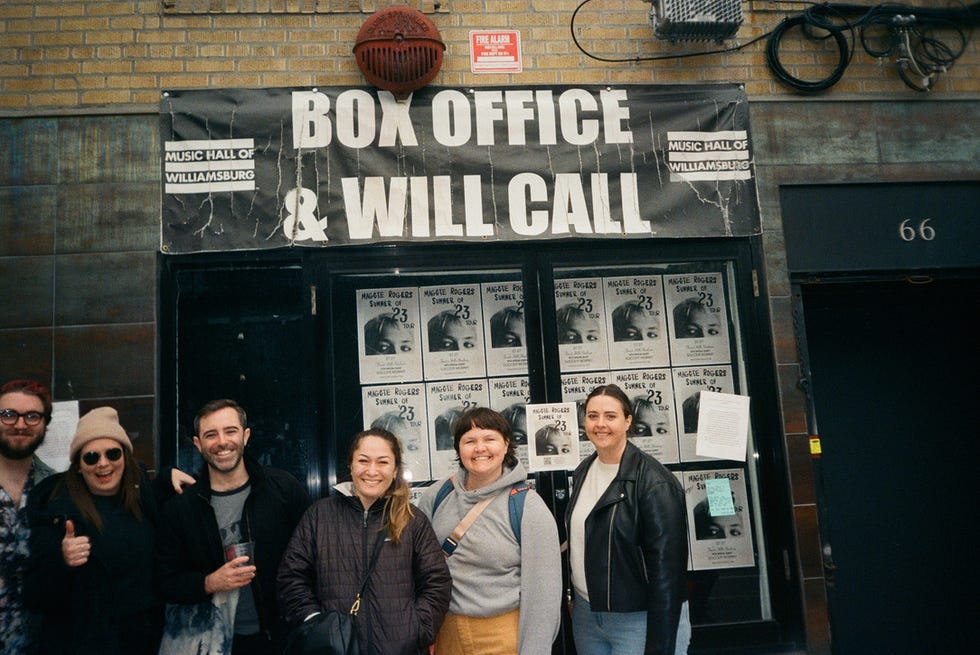What I Found Among Strangers in the Maggie Rogers Ticket Line
My hair is wet and I’m running—late and again. I’m bee-lining to the Spring Street 6, green smoothie in hand, shifting my work backpack from one shoulder to another as I step around morning walkers lacking an urgency in their gait.
“Wanna take a bet,” I record in a voice note to my friend as I clomp down my stairs, “on how long this line will be?”
“Six blocks?” she says in response—a hopeful lift in her voice—with the caveat that “blocks are longer in Williamsburg.”
A flurry of texts I send her in real time:
“Okay I’m seeing a line”
“But I’m on the block”
“God I really need coffee”
“People on their laptops on the ground lmao”
“Lawn chairs”
“Okay we’re turning”
“Okay we’re wrapped around an entire city block”
It’s 9:39 a.m. when I find the end of the line.
We’re all here for one reason: Singer-songwriter Maggie Rogers is selling concert tickets to her summer tour in-person, at box offices in cities along the tour. The difference between this Brooklyn tour stop and others is that Maggie herself will be manning the ticket booth at the Music Hall of Williamsburg in New York City.
“We’re going old school,” Maggie (I’m on a first name basis with all female artists) explained in the video she posted to Instagram the afternoon prior. The idea, she said, was to confront the “intense ticketing fees” and “insane bot activity” concert goers were seeing in Ticketmaster sales a la Taylor Swift, Blink-182, and Dave Matthews Band.
I could relate. A few weeks beforehand, I waited in a digital line for John Mayer tickets, multitasking as the bar indicating where I “stood” appeared frozen on my computer screen. By the time I was admitted to the sale, the cheapest ticket was $400. By contrast, Maggie’s tickets are selling from $25 at the lowest, to $125 at most, and fans are able to hand pick the section they want to sit in.
“Come buy a concert ticket like it’s 1965,” Maggie told us. We’ve come in droves.
We are a contiguous line stretching around and beyond an entire city block. We are women and (admittedly fewer) men and dogs. Our bodies are standing and squatting and sprawled out on blankets with our laptops out, really testing the upper limits of what it means to work from home. Some of us appear to be in groups and some, like myself, are alone. Some of us had the forethought to bring lawn chairs; others, books and knitting materials.
I find my place in line behind a woman with yellow billowing pants and big headphones, carrying multiple bags like me.
“How long,” the woman, Claire, turns to me, “do you think this will take?” We decide we can’t imagine waiting longer than two hours, and are hopeful to be out of there by 11 a.m. Claire has gotta be at work in 30 minutes and is wondering how much time to buy herself with a temperamental boss who once stopped working with a client when she learned they liked meatlovers pizza. “Meatlovers pizza!” Claire repeats for emphasis, making her eyes huge, and I understand the stakes. I feed her the word “consultation” to describe a dentist appointment—more official. My own approach to work has been to field incoming emails and calls from a standing position in line, and make up for the missed time later that day.
Right before 10 a.m when the sale starts, Maggie Rogers herself strolls by, more petite than I expected, and wearing a fabulous usher jacket. She’s exuberantly greeting us—all hi, hello, how are you this morning—and we line-dwellers are stunned into silence. We make eye contact with one another, dumb smiles on our faces, like did that just happen? “She’s so cute!!” Claire says to no one, eating a muffin.
Behind me, a woman is holding her laptop and skimming off Muji’s free wifi. Later, she’ll say that her wrists are sore from maintaining this form. Somewhere behind her, another fan carries a gigantic speaker playing “Falling Water.”
In Portland, Maine, my friend Peyton is at a pre-sale herself, texting me updates. Peyton has a flight to catch in a few hours, and her line companion is frantically phoning a friend to come stand in for her. “Line relationships run deep,” I say. In my own line, we take turns going on coffee runs and pee breaks (another companion, Katie, says we can use her friend’s nearby apartment bathroom if need be) and stepping out of line to field work calls. Imagine being at a concert and asking someone to hold your standing space while you go pee.
I feel like Rory Gilmore in the revival when she’s reporting a piece for GQ about line dwellers in New York City. They have a specific reputation; I admit to judging line-dwellers outside the Supreme Store or Prince Street Pizza, bodies single-filed into seeming infinity. The thing about waiting in long lines is that people assume one of two things about you: that you’re hip and in-the-know, or that you’re an idiot getting played by the very nature of time. We receive both reactions.
What—the curious passersby want to know—are you all waiting for? A single voice utters Maggie’s name, the lorax speaking for the trees. “Never heard of her!” a pedestrian tells us. One man earnestly says he’ll have to look up Maggie’s music, and wishes us a blessed day. Another guy, wearing a matching purple turtleneck with his Dachshund makes a face like yikes. Like, you’ve been waiting how long? “Is this the line for Maggie Rogers?” one millennial, dressed unseasonably in shorts and a bucket hat, asks. “Worth it!”
We New Yorkers, we millennials, are so entrenched in the idea that time and value are negatively correlated. We want the quickest hack, the least time commitment with the greatest pay off. Eight minute abs and next day prime delivery and no sacrifice. Even Maggie sings in “Anywhere With You,” “You tell me you want everything, you want it fast / But all I’ve ever wanted is to make something fucking last.”
I might not wait for bananas to fully ripen, my nails to dry before leaving the house, or a man to text me first, but I will wait for things that are I deem worth it, like good restaurants that don’t take reservations, my friends, when they say 6 p.m. but really mean closer to 7, and Maggie Rogers to sell me a concert ticket.
Last week, I was invited to an experiential art show in Greenpoint. It was put on by an artist collective in an old shuttered luncheonette that appeared frozen in time, cast iron pans hanging on the abandoned kitchen’s wall.
For more than an hour after the advertised showtime, the artists and various friends—it wasn’t clear who was who—putzed about, chatting, giving no indication of when the show might begin. This made me anxious at first, with nothing to do but engage. I sat across from a woman, a curator at the MoMA who was also there for work, who offered to run to the bodega for Modelos. Our timidness, and eventual comfort, with each other were part of the show of course, the curator said in a lilted French accent, gesturing to the people surrounding us in various attitudes of conversation. “It always is; You cannot separate the experience and the people from the art.”
Maggie knew this when she invited us all to buy tickets under the guise of accessing her—in person that day, or later in concert. What she was really doing was curating an experience for us to meet one another.
The last time I shared a line with hundreds of people I had one distinct similarity with, it was waiting for a Covid test at CityMD in the peak of the pandemic. The Maggie Rogers Experience, which is what I call it now, feels so singular because it’s unlike anything our generation has ever seen in the name of entertainment. We forget that Woodstock attendees queued up outside of record stores for hours, or how Springsteen fans camped out for days ahead of ticket sales, perhaps sharing beers and toilet paper with one another, because the sacrifice today is less bodily.
Maggie’s fuck you to Ticketmaster also extends to a larger protest against what author Shelia Liming calls the “quiet catastrophe” brewing in our social lives: “how technology has enabled us to avoid the social awkwardness and rejection inherent in building community.” Standing body-to-body with strangers, we confronted that awkwardness head-on.
By the time the Music Hall is in sight, Claire, Katie, and I become a pod with the duo in front of us, teachers who take turns going on margarita runs from the bar around the corner, as well as the guy in front of them, carrying a film camera. We’re talking about avocado mattresses when Katie interrupts us—she’s gotten word from her fiancé. “I’m so sorry,” he texts, “but Maggie left.” He’s seen Maggie’s Instagrammed departure, a photo of her clutching her chest in gratitude from a car, before we have. It’s the funniest thing we have ever heard: how close we got, how Not The Point it had become to meet Maggie herself.
Sure, she was what brought us all here, but seeing Maggie as the lone attraction in our ticket buying experience was missing the experience itself.
It’s missing the intangible sense of community bound by music, and it’s missing the kindness of the bartender who let me use the bathroom behind the beaded curtains without buying anything, and it’s missing the endurance, the way my back killed and Claire saw her ex in line, and the singular pulsing expression of art we thought we were pursuing, but really we were creating.
When our seven-person line family reaches the scarlet velvet rope, four and a half hours after we first arrived, the security guard at the box office asks if we’re “all together.” Yes! we tell him. You can’t separate us now. We’re family.
We don’t have to call everything art, but The Maggie Rogers Experience—that was a hell of a show.
Jenna Kunze is a New York based journalist covering stories impacting Indigenous peoples across the US and Canada.



